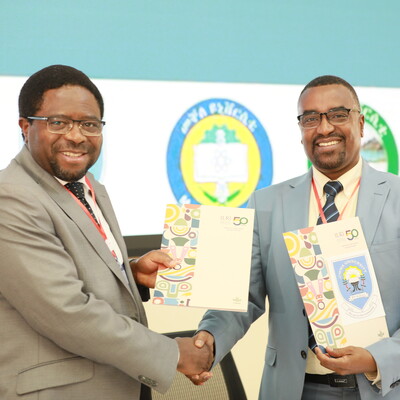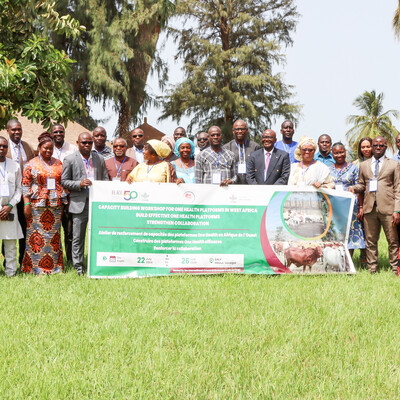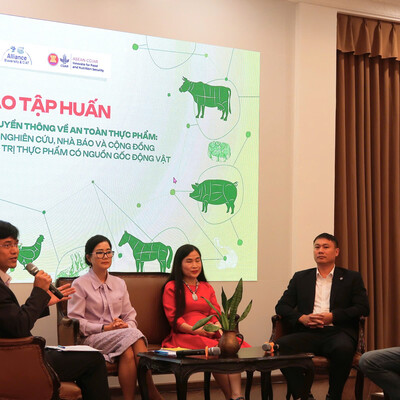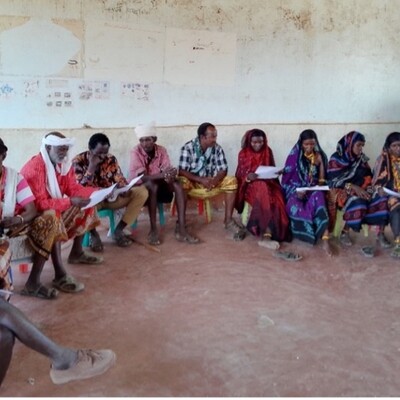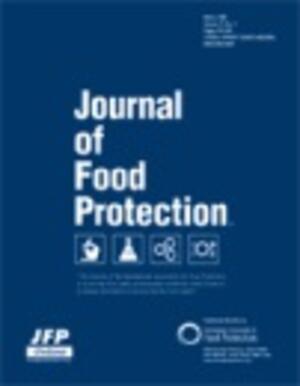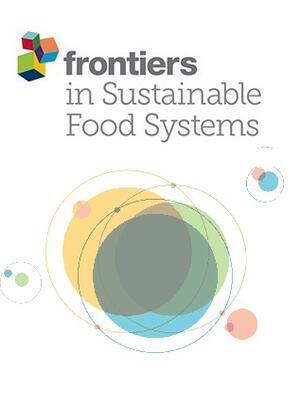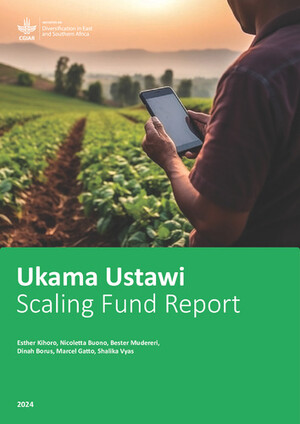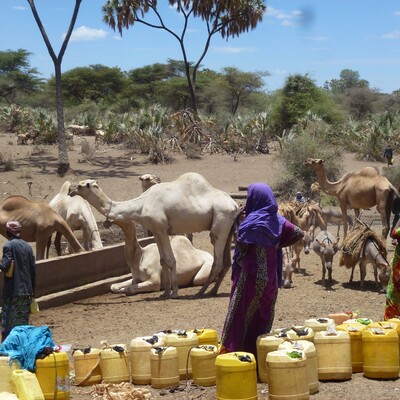
Pork from paddock to plate: volunteering to improve food safety in Vietnam
(This post was written by Marisa Mitchell, volunteer at International Livestock Research Institute (ILRI) and posted at https://www.raidaustralia.net/index.php/news/item/779-marisa-mitchell)
I’m a Research Officer on a one-year assignment with the International Livestock Research Institute (ILRI) as part of the Australian Volunteers Program.

Marisa at ILRI office with ILRI Regional Representative for East and Southeast Asia, Hung Nguyen-Viet (photo credit: Australian Volunteers International).
ILRI is one of the CGIAR research centres, working towards improving global food security, reducing poverty in developing countries by researching solutions for a more sustainable use of livestock.
The focus of my volunteer assignment is to support research activities within the SafePork project, an ACIAR-supported project focusing on market-based solutions to improve food safety along the pork-value-chain in Vietnam. In the last 10 months, I have been introduced to completely new perspectives and ideas which have challenged my own beliefs and furthered my interpersonal skills. This environment has enabled me to grow as both a person and as a researcher, as well as well as help me appreciate the need to stop, listen and reflect.
On a given day I can either be in the field collecting data, analysing information and writing up results, attending conferences or meeting with our partner organisations to enhance our research activities.
Working with ILRI’s key Vietnamese partners we have recently undertaken research activities to develop a food safety assessment tool, and identify light-touch interventions to improve food safety along the pork-value-chain.
My role is also to support colleagues during the research activities and assist in identifying gender aspects across the project to ensure gender-sensitive approaches are considered. I’m passionate about female empowerment and gender equity in agriculture, and have been able to contribute to one of the key objectives of the SafePork project which focuses on developing and incorporating interventions whereby both women and men can benefit equally.
I have had the privilege to work on cattle and sheep stations across Australia and a permaculture farm in Southern India and I understand heavy workload, dedication and passion of both female and male farmers have in producing safe, quality food. All actors (including the customer) within the food system have a responsibility to ensure that they can either produce, supply or prepare food that is safe to eat.
Here in Vietnam, food safety is a major public health concern, and a high priority issue for the government.
There is a high concern of chemical and pesticide use on agriculture and livestock farms in Vietnam and the impact it is having on human health. However, previous work by ILRI, under the ACIAR funded PigRisk project found that biological hazards (including Salmonella bacteria) in food presented a higher risk to human health than chemical hazards. Food safety predominantly impacts those living in resource poorer areas, with pregnant and lactating women and children particularly vulnerable to foodborne disease.
A lot of the focus of the Safepork project is to develop interventions which will enable people to adopt behaviours which are conducive in producing safe food in the pork value-chain. This includes working with abattoir workers and retailers to understand the factors and incentives they need to improve the safety of the food. Thus far, I have used my experience in health promotion and research, to work with ILRI partner organisations and stakeholders in the design of research surveys, data analysis and research communication.

Visit to the wet market, Hanoi (photo credit: Australian Volunteers International).
A highlight was participating in the recent Regional Symposium on Research into Smallholder Pig Production, Health and Safety in Hanoi.
Alongside gender experts, ILRI colleagues and myself facilitated a session on gender and equity in the pork value chain. Thanks to organisers’ commitment and support, we were able to include gender and equity as a key focus area of the symposium.
Further, aligned with my passion to reduce my own single-use plastic and carbon footprint, I and my colleagues worked together to ensure the symposium was environmentally friendly. In addition to printing conference booklets on recycled paper, we were able to save an estimated 600 water bottles and used no plastic straws.
It is incredible when you connect and build such positive and meaningful partnerships with people, regardless of language.
Recently, myself and team members from NIAS and ILRI were out in the field to conduct a survey of the Indigenous Ban pig in the Hoa Binh province in North Vietnam. We spent the day talking with smallholder farmers who are facing some of the most extreme climatic changes and are also producing some of the safest pork meat!
It was amazing to be invited into their homes, listen to their stories and walk around their farms. Although my Vietnamese is still limited, with the help of a colleague who translated the interviews and watching the body language I was completely immersed in the discussion and was able to engage with the interviewees and connect to their story.
Moving to Vietnam as an Australian volunteer has been an incredible work and life experience.
Marisa Mitchell is an Australian volunteer with the International Livestock Research Institute.
The Australian Volunteers Program is funded by the Australian Government. To learn more, view more than 100 roles currently available and apply, visit www.australianvolunteers.com.






